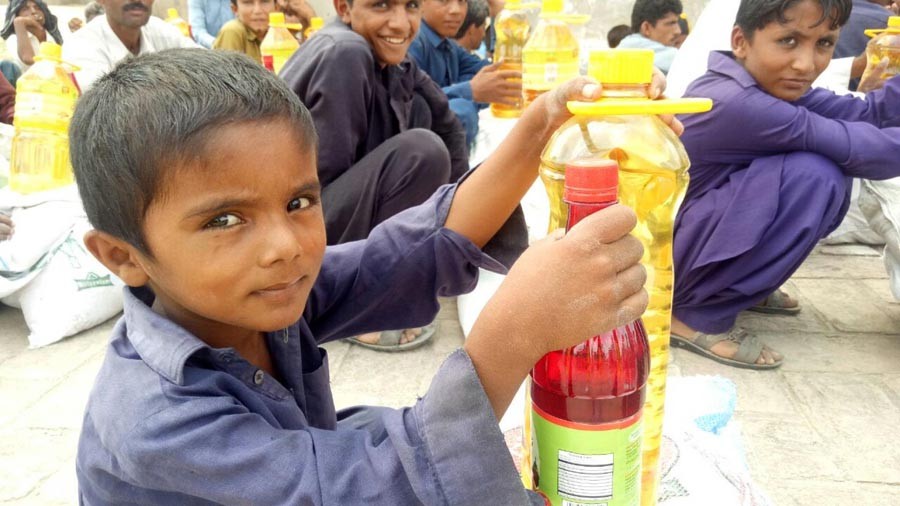
This year, Bait ul Mal is late in distributing the Ramzan package to beneficiaries

Two women are sitting on a bench outside the Pakistan Bait-ul-Mal (PBM) office in Lahore. Forty-five year old Rani Bibi, a resident of Mecca Colony, is holding a file of breast cancer treatment. She has received two chemotherapy treatments in Inmol Hospital Lahore. However, for her third treatment, Bibi needs approval of funds for the last two months. The long procedure of getting funds has caused a delay in her treatment. She must undergo at least six such therapies, one each month.
"I have visited this place about 25 times for procuring approval for my treatment. I need Rs6,60,000 for my six chemotherapy treatments."
Rasoolan Akhter, 65, a resident of Wagah Town Lahore tells TNS that she is here to inquire about the Ramzan package which used to be delivered every year to the needy people. "I am a widow living in a rented house. Generous people help me. For the last one decade, Ramzan has been the only month when I do not have to seek help from anyone because of Pakistan Bait-ul-Mal’s grocery package".
PBM used to distribute more than 30,000 Ramzan grocery bags in different parts of the country which were bought from Utility Stores. Rice, flour, oil, sugar and pulses were the main ingredients of this bag.
"I agree a couple of months before and after the annual budget are tough. Still, it’s hard to agree with Rani Bibi that the process of allocating medical help takes more time than the required time," says Barrister Abid Waheed Sheikh, Managing Director, Pakistan Bait-ul-Mal who is based in Islamabad.
"I have tried to make the procedure of three categories of Individual Finance Assistance (IFAs) smooth and judicious," he says. These IFAs are related to medical, education and personal assistance.
"Yes, we are late this year in distributing the Ramzan package, however, we are coming out with Ramzan and eid package after the 15th of Ramzan," ensures Abid Waheed. "Apart from individual assistance, the first Pakistan Thalassemia Centre has been established and Pakistan Sweet Homes for orphan children are getting quality education, food, and shelter."
"The state should provide money to its underprivileged populace to start new businesses through small loans rather than treating them as beggars," says Zamurd Khan, former Managing Director Pakistan Bait-ul-Mal.
PBM is receiving hundreds of applications for medical treatment each month. Data shows that cancer patients are leading assistance seekers; closely followed by heart, liver and kidney patients. Financial assistance may vary between Rs5000 and Rs10,00,000. A widow, disabled and infirm, may get upto Rs50,000 a year. More money is allocated for medical and educational purposes. Any student can get rupees Rs80,000 for a year and up to Rs10,00,000 can be allocated for medical treatment.
"Unfortunately, there are some people in the department who do not hesitate in committing all kinds of wrongdoings which not only create frustration for the already oppressed individuals but also defame their colleagues," says a deputy director based in Islamabad on the condition of anonymity. "This dissolute brashness fails to bring together fool-proof policies of delivering services."
A few overlapping functions are also a snag in earmarking funds. Benazir Income Support Programme (BISP) and Pakistan Bait-ul-Mal have certain areas which overlap, such as individual financial assistance, resulting in higher administrative expenses. In August 2014, Pakistan government gave an undertaking to the International Monetary Fund (IMF) to reform the social safety nets for decreasing poverty and providing cushion to the underprivileged.
"The state should provide money to its underprivileged populace to start new businesses through small loans rather than treating them as beggars," says Zamurd Khan, former Managing Director PBM.
"Individual financial assistance is nothing but a programme to convert people into beggars. PBM has Rs5 billion to spend annually. This amount can generate income by helping people to start their businesses," he says, adding, "This strategy will help PBM in producing income which can be spent for medical and educational purpose at a larger scale."
Read also: Banking on timings
"Overlapping is a problem in almost every department that is why we have not placed personal assistance as priority for the last four years," says Abid Waheed.
"We have been focusing more on educational and medical assistance. Since 2014, PBM has been supporting 28 per cent of Thalassemia patients in the country," he adds. "From now onwards, to facilitate cancer patients, the department will ensure half of the amount in advance and full for heart, liver and kidney patients. This is just to help the underprivileged timely and in a respected way."